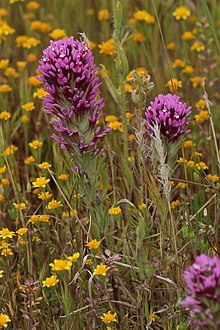Castilleja exserta
| Castilleja exserta | |
|---|---|

| |
| Scientific classification | |
| Kingdom: | Plantae |
| Clade: | Tracheophytes |
| Clade: | Angiosperms |
| Clade: | Eudicots |
| Clade: | Asterids |
| Order: | Lamiales |
| Family: | Orobanchaceae |
| Genus: | Castilleja |
| Species: | C. exserta
|
| Binomial name | |
| Castilleja exserta (Heller) Chuang & Heckard
| |
Castilleja exserta (formerly Orthocarpus purpurascens) is a species of plant in the genus Castilleja which includes the Indian paintbrushes. Its common names include purple owl's clover, escobita, and exserted Indian paintbrush.[2]
This species is native to the Southwestern United States in various habitats of California, Arizona, and New Mexico; and to Northwestern Mexico.[3] It is an introduced species in Hawaii.
Description
[edit]
Castilleja exserta is an annual herb about 100–450 millimetres (4–18 in) tall with a hairy stem covered in thready leaves. Like other related Castilleja plants, this species is a hemiparasite, deriving some of its nutrients directly from the roots of other plants by infiltrating them with haustoria. As a result, its own leaves are small and reduced.
Although this species is variable in appearance and easily hybridizes with other Castilleja species, it generally bears a brightly colored inflorescence of shaggy pink-purple or lavender flowers. The thin, erect bracts are usually tipped with the same color, giving the inflorescence the appearance of a paintbrush.[4]
Varieties
[edit]Varieties include:
- Castilleja exserta var. exserta — pale purple owlclover.[5][6]
- Castilleja exserta var. latifolia — wideleaf Indian paintbrush; endemic to coastal California.[6][7][8]
- Castilleja exserta var. venusta — endemic to California: Mojave Desert, southern San Joaquin Valley.[6][9][10][11]
Bay checkerspot butterfly host
[edit]This is a crucial host plant for the Bay checkerspot butterfly (Euphydryas editha bayensis), which is a threatened species that is endemic to the San Francisco Bay region in California.
The seeds were harvested by indigenous peoples of California for food.[12]
-
2015
-
Antelope Valley Purple owl's clover
References
[edit]- ^ "NatureServe Explorer 2.0". explorer.natureserve.org. Retrieved 16 April 2023.
- ^ CalFlora database: Castilleja exserta . accessed 3.23.2013
- ^ Sullivan, Steven. K. (2018). "Castilleja exserta". Wildflower Search. Retrieved 2018-07-06.
- ^ "Castilleja exserta". in Jepson Flora Project (eds.) Jepson eFlora. Jepson Herbarium; University of California, Berkeley. 2018. Retrieved 2018-07-06.
- ^ CalFlora: Castilleja exserta ssp. exserta
- ^ a b c "Castilleja exserta (A.Heller) T.I.Chuang & Heckard | Plants of the World Online | Kew Science". Plants of the World Online. Retrieved 2021-07-19.
- ^ CalFlora: Castilleja exserta ssp. latifolia
- ^ "Castilleja exserta var. latifolia (S.Watson) J.M.Egger | Plants of the World Online | Kew Science". Plants of the World Online. Retrieved 2021-07-19.
- ^ CalFlora: Castilleja exserta ssp. venusta
- ^ USDA: C. e. ssp. venusta
- ^ "Castilleja exserta var. venusta (A.Heller) J.M.Egger | Plants of the World Online | Kew Science". Plants of the World Online. Retrieved 2021-07-19.
- ^ Lady Bird Johnson Wildflower Center Native Plant Information Network (NPIN) — Castilleja exserta (Purple owl's clover) . accessed 3.23.2013
External links
[edit] Media related to Castilleja exserta at Wikimedia Commons
Media related to Castilleja exserta at Wikimedia Commons- Closeup photos — at Henry Coe State Park, S.F. Bay Area.
- Castilleja exserta — U.C. Photo gallery
- NatureServe apparently secure species
- Castilleja
- Flora of Northwestern Mexico
- Flora of Arizona
- Flora of Baja California
- Flora of California
- Flora of New Mexico
- Flora of Sonora
- Flora of the California desert regions
- Flora of the Klamath Mountains
- Flora of the Sierra Nevada (United States)
- Natural history of the California chaparral and woodlands
- Natural history of the California Coast Ranges
- Natural history of the Central Valley (California)
- Natural history of the Channel Islands of California
- Natural history of the Mojave Desert
- Natural history of the Peninsular Ranges
- Natural history of the San Francisco Bay Area
- Natural history of the Transverse Ranges
- Butterfly food plants
- Plants used in Native American cuisine




